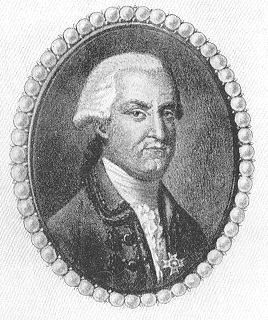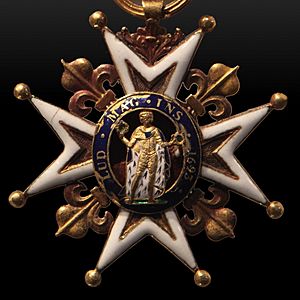Louis de la Corne, Chevalier de la Corne facts for kids
Louis de la Corne (born June 6, 1703 – died November 15, 1761) was an important figure in the history of New France. He was born at Fort Frontenac, which is now Kingston, Ontario, Canada. Louis de la Corne started his career in the military as a young officer in 1722. He quickly moved up the ranks, becoming a full ensign just five years later.
In 1728, he got married. Besides his military work, he also became very involved in the fur trade. This was a common thing for officers to do back then. Both his military and business careers did very well. He soon earned promotions to lieutenant and then captain.
A Brave Soldier
Louis de la Corne gained a lot of experience fighting in wars. During King George's War, he showed great bravery in Acadia. For his actions in the Battle of Grand Pré, he received a special award called the Cross of Saint Louis in 1749.
He also took part in other military actions during Father Le Loutre's War. He helped organize groups of new settlers to defend their lands. One important event he was involved in was the Battle at Chignecto.
Exploring the West
In 1752, Louis de la Corne was given a big job. He became the commander of the poste de l’Ouest, which means "Western Post." These were French trading posts started by Pierre Gaultier de Varennes, sieur de La Vérendrye. His job was to lead these posts for three years.
He took over from another commander, Jacques Legardeur de Saint-Pierre. In June 1753, Louis de la Corne set out with 57 men. His brother, Luc de la Corne, helped arrange more supplies for him. During his time in the west, Louis de la Corne was very active. He made improvements to Fort Paskoya (now Le Pas, Manitoba). He also built a new fort called Fort Saint-Louis, which is now known as Fort de la Corne in Saskatchewan. He even explored the Carrot River valley.
Another commander, Louis-Joseph Gaultier de La Vérendrye, took over from him in 1756. However, because of the Seven Years' War, La Vérendrye never actually went west. He managed the business through other people.
Later Life and Sad End
By July 1755, Louis de la Corne was back in the east. For the next five years, he was very busy with military duties. He patrolled the important waterway between Montreal and Lake Ontario with many soldiers. He was recommended for more military awards, but he never received them.
In 1761, he was supposed to be sent to France. Sadly, the ship he was on, the Auguste, sank off the coast of Cape Breton Island on November 15, 1761. Louis de la Corne was one of the people who died in this shipwreck.
See also
 In Spanish: Louis de la Corne para niños
In Spanish: Louis de la Corne para niños



